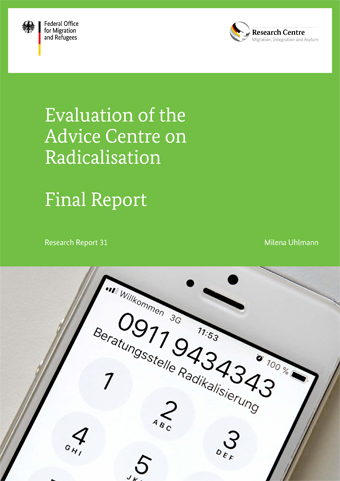Who we are ,
This content is also available in
Are you afraid that your child, student or employee might become radicalised? Are you uncomfortable with how enthusiastically your colleague talks about strict adherence to religious rules? Are you worried that your girlfriend supports violent jihad?
Where can I find help if someone is becoming radicalised?
Our team at the Advice Centre on Radicalisation is your first point of contact, if you are concerned that a person in your environment might turn to a radical Islamic group. We are here for you if you are at a loss. No matter what questions you have, we will be happy to advise you on the phone.
Our aim: to help you assess the situation correctly. If there is a risk of radicalisation, we support you in bringing your friend, child, pupil or employee back into the circle of friends, family, class, team. Our advice is free of charge and confidential.
We listen, answer questions and decide together with you how to proceed. If you wish, we can put you in touch with a contact person in your area. The experienced staff at the Advice Centre will advise you individually and with practical tips.
We provide advice in German, English, Turkish and Russian. For other languages, we work with professional interpreters if required.
How do I recognise radicalisation?
As in every religion, there are also moderate and radical movements in Islam. A strict Muslim is not a religious extremist.
Our personnel will therefore go through key points with you on the phone, which from experience may play a role when a person becomes radicalised. Even if one or more of these points apply, it is only an indication that your student or son, your employee or colleague could be on the way to radicalisation. Whether the person is really turning to an extremist ideology can only be judged in the context of a more extensive consultation with experts from local advice centers.
What can I do if someone becomes an extremist?
Trust can help when someone turns to an extremist ideology: those who trust their friends, family or teachers listen to them and, in the best case scenario, believe them. However, people who are becoming radicalised often become withdrawn. The people around them often feel that they can no longer get close to their child, student or friend. How can this bond be strengthened again? Our experienced counsellors will discuss this with you. What can you bring up and how? What is better not to say?
Depending on the situation, relatives, friends, teachers or Imams may also be involved in the advice and consultation process. Trust in these people and in you can slowly bring your friend or co-worker, your daughter or student back from radicalisation or prevent radicalisation. There is no guarantee of success. But experience shows that it can work.
4,500
The team of the Advice Centre on Radicalisation at the Federal Office for Migration and Refugees (BAMF) conducted 4,500 telephone conversations since the centre was established in 2012.
About the Advice Centre on Radicalisation
In the Federal Office's Advice Centre on Radicalisation, a team of educators, social workers, psychologists, political scientists and Islamic scholars provides advice to callers about religiously motivated extremism. They listen and accompany those seeking advice and are working together with more than 100 counsellors in independent, local counselling centres. They all have experience with Islamist radicalisation and know how to help.
You can find out about the standards in advice and counselling in the social environment of (presumably) radicalised Islamist persons in the general handbook of the advice centre network of the Advice Centre on Radicalisation of the Federal Office for Migration and Refugees (BAMF).
We pursue the goal of constantly further developing our work with the help of scientific findings. For this reason, we work closely with the BAMF Research Centre, which is responsible for scientific monitoring in the field of deradicalisation and research into various aspects of religiously based extremism. Further information about the work of the Research Centre can be found here.
Evaluation of the Advice Centre on Radicalisation
From April 2016 to August 2017, the research centre of the Federal Office for Migration and Refugees evaluated the advisory services for persons from the social environment of (potentially) radicalising persons offered by the BAMF Advice Centre on Radicalisation and its four local civil society partners, which were funded by the Federal Government at that time.

